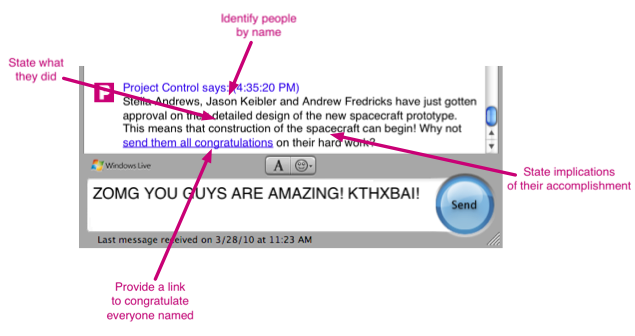Okay. I’m going to ask you to bear with me as I kick the can around a little.
On March 26, Ty Kiisel of @Task posted an article Informed Work Management Decisions Require Trustworthy Project Data. I commented on this post that I believed accurate status updates were a function of effectively translating IT language into stakeholder language.
 Ty commented that the problem was greater than that. Specifically, he used the example of team members sharing accomplishments with their friends on Facebook. They do so willingly because they get immediate, positive gratification. Since typically project managers and stakeholders neglect to congratulate the good, and get up in arms over the bad, team members get substantially more negative feedback than positive.
Ty commented that the problem was greater than that. Specifically, he used the example of team members sharing accomplishments with their friends on Facebook. They do so willingly because they get immediate, positive gratification. Since typically project managers and stakeholders neglect to congratulate the good, and get up in arms over the bad, team members get substantially more negative feedback than positive.
There is a management issue there, to be sure; one that’s as old as business. Taking a moment to give positive feedback is something everyone in business has heard, and most forget to do.
But what if they don’t have to?
I am an unabashed gamer. I play World of Warcraft late at night for hours on end with my arcane mage named “Khlammy“. It’s a sickness, really, but I digress. Something that’s taken hold of the gaming community is a concept called Achievements Tracking. Basically, if you perform some kind of special, measurable feat in the game, you earn an achievement for it, and all of your friends in-game get a notification of what you’ve done. It immediately gets your friends to reply to you, “wow!” “great!” “you’re amazing”.
I have a point, I promise.
 What if, in a project environment, there were a similar system? Much of what could be considered an achievement (or, let’s call them “accomplishments”) can be tracked already in whatever software solution is active in the environment. Project deliverables are known; when a deliverable gets approved, why not have the software send out a little notification through the project team’s instant messaging service? It could let everyone know not just that the deliverable was approved, but congratulate the individuals responsible by name.
What if, in a project environment, there were a similar system? Much of what could be considered an achievement (or, let’s call them “accomplishments”) can be tracked already in whatever software solution is active in the environment. Project deliverables are known; when a deliverable gets approved, why not have the software send out a little notification through the project team’s instant messaging service? It could let everyone know not just that the deliverable was approved, but congratulate the individuals responsible by name.
Opens up a few doors, as I see it. Call it “behaviour push” for lack of a better term at the time of this writing.
- An instant message goes out to the entire project team (or certain select workgroups)
- Recipients have the option to send “congratulations” instant messaging notes to those responsible
- Management gets an automatic reminder to also congratulate those people
- Casual water-cooler / in-the-elevator conversations can begin, “hey I saw you did blah blah, good for you”
It sets individuals up to receive consistent, positive feedback for specific things (as opposed to generic appreciation which always seems less sincere). When people feel encouraged, they tend to work harder, enjoy their jobs more, and take greater pride in their work.
From a status reporting perspective, there’s a hard list of actual accomplishments that were done during a particular period. The project manager could rip that list out of the printer, go to the individuals responsible and just walk through it, asking for the details they need. That helps the PM to prepare the status reports with a little more accuracy.
From a stakeholder perspective, if they also received a “major milestone complete” instant message, they get a little, unexpected perk during their workday that something major has been done for them. It also helps prevent surprises during status reviews.
It seems like such a little thing…but if Ty is correct and team members proudly update their Facebook profiles with work accomplishments specifically for those little feedback pick-me-ups, does that not suggest integrating feedback mechanisms into software could be worthwhile? In project software specifically, you already know what work needs to be done and who’s responsible for that work–the raw materials are all there for something that could drive feedback and encourage positive reinforcement.
 Of course, this is just a high level idea. There’s probably lots of technical, frequency, right-of-communication and implementation issues to consider. But there seems these days to be such a desire to find an application for social media in the workplace, that people are forcing it. That lends a contrived aspect to the implementation. It feels phoney, therefore it is phoney and people don’t accept it.
Of course, this is just a high level idea. There’s probably lots of technical, frequency, right-of-communication and implementation issues to consider. But there seems these days to be such a desire to find an application for social media in the workplace, that people are forcing it. That lends a contrived aspect to the implementation. It feels phoney, therefore it is phoney and people don’t accept it.
The above suggestion could be a way to legitimize social media at work, drive desirable behaviour from workers, and help remind management in a practical, non-invasive way to go thank their people for their hard work, at a time when it would be relevant.
Of course, I can also see great potential for misuse (especially on the part of management)…but that’s another story.
Update: I shouldn’t let Ty have all the credit for the inspiration to this post. Glen Alleman of Herding Cats also provided a white paper that I read when I was down with the flu last week. I put it together with what Ty wrote in his article, which is where the above came from. Glen has since provided an update referencing this article.
Related articles by Zemanta
- Collaboration “in the Wild”: Some Observations (cazh1.com)


![Reblog this post [with Zemanta]](http://img.zemanta.com/reblog_e.png?x-id=e6ccaad9-0f29-455d-b17a-4c67440e98eb)